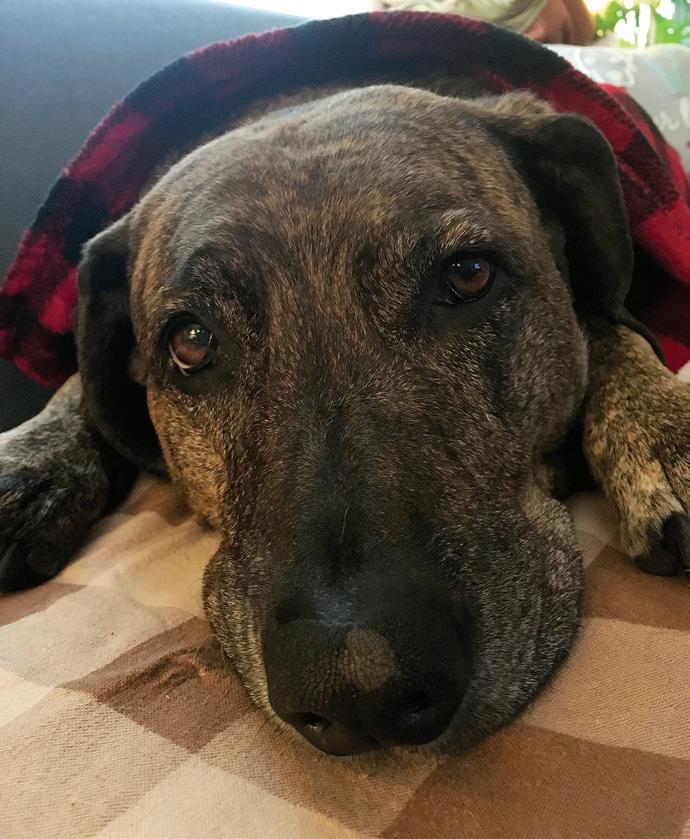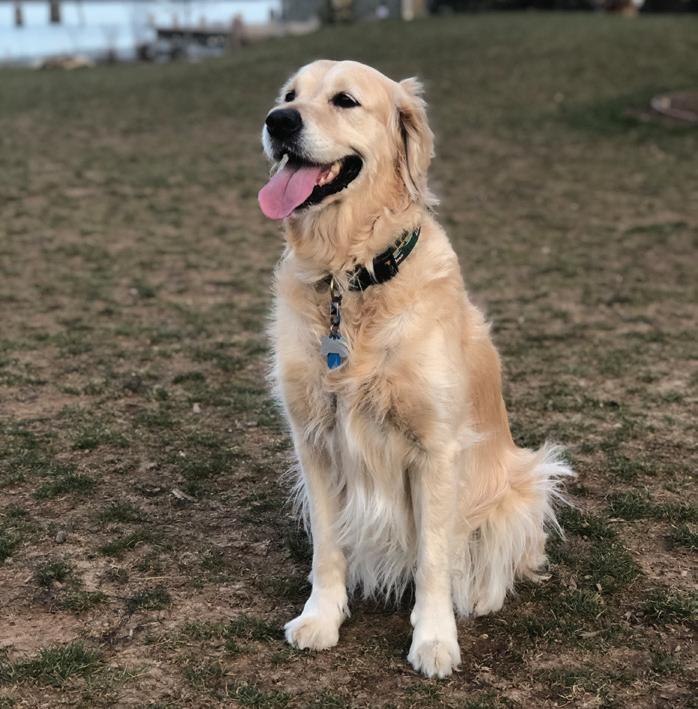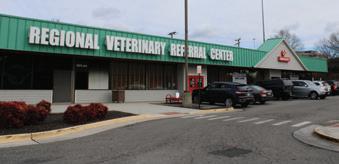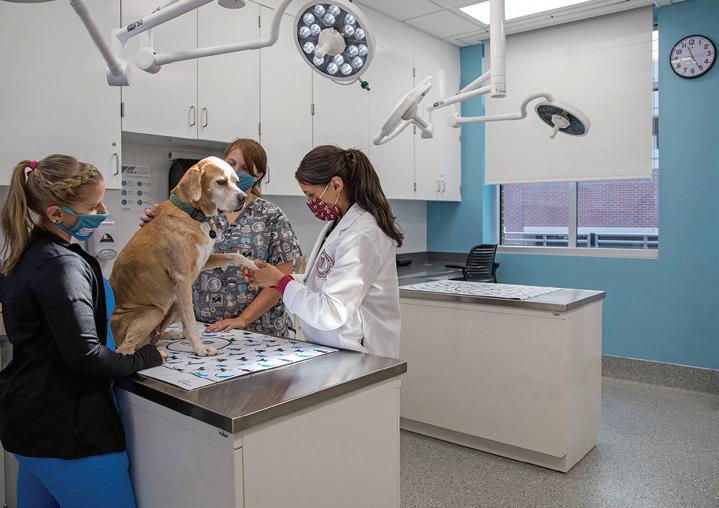
12 minute read
PETS
Canine Cancer
BY SUSANNAH MOORE
They say a late-night phone call never brings good news.
In this case, it was my veterinarian calling to tell me that my six-year-old golden retriever, Rosie, had cancer. It was 9 p.m. She had waited until the end of the day because she dreaded the difficult conversation.
I felt shocked, overwhelmed and scared. I knew golden retrievers were prone to developing cancer, and about 60 percent of them do. I just didn’t think it would happen to my dog — at least not so soon.
Rosie had successful surgery to remove the squamous cell carcinoma, but she developed a second type of cancer, melanoma, a few months later, which is much more resistant to treatment.
The cancer journey with your beloved pet can often be confusing and discouraging, but you are not alone and treatments for canine cancer have come a long way and will continue to improve in the years to come.
Here are a few things I learned while helping Rosie fight cancer and some words of advice and hope from local veterinary oncologists, researchers and pet owners.
BE PROACTIVE
According to the American Veterinary Medical Association, approximately one in four dogs will develop abnormal cell growth at some stage in their life and almost half of dogs over the age of 10 will develop cancer. A Morris Animal Foundation lifetime study is currently trying to determine exactly why golden retrievers in particular are so susceptible to the disease.
Cancer has normally been associated with older dogs, but it is not uncommon to see cancer develop in dogs under 6 years of age. Cancer treatment is expensive, so it is important to get pet insurance for your dog early on in life, before they develop a problem.
Be on the lookout for strange bumps or abnormal behavior in your dog. For Rosie, her second cancer started in her toe and manifested similarly to an infected, broken toenail. It is better to assume that something is cancer and get it checked out quickly, then to find out after the cancer has progressed. Early detection is key for cancer treatment in both humans and animals.
Dr. Tuohy performs exam at the Animal Cancer Care and Research Center. PHOTO BY ANDREW MANN, VIRGINIA TECH
Dr. Kathleen Tidd is an oncologist at the Regional Veterinary Referral Center in Springfield. She believes that because owners care more about their pet’s health and pets are living longer, owners and veterinarians are becoming more proactive about detection. Researchers recently developed a test to detect bladder cancer and she believes it is only the beginning of screenings that will become routine for at-risk breeds and older dogs.
“I think something that is really starting to take hold is how to screen dogs better. Dogs can’t talk, which is part of why we like them so much,” Tidd observed. “People with cancers might complain about chronic pain they’re experiencing or GI distress or other things that might tip them off that something is going on, whereas a dog or a cat? A. They don’t complain. B. If it’s caught, we don’t usually pick up on it until it’s something more serious.”
FIND A COMMUNITY
Going through cancer diagnosis and treatment with your pet can often feel lonely. Some friends and family members may not understand how much

Roscoe. PHOTO BY LAURA DURHAM
you care about your pet and can make unhelpful or hurtful comments.
Surround yourself with people who can offer you support and advice during this time. Ask around at your local dog park, you may be surprised how many dog owners have gone through a similar experience.
The Dogs with Cancer group on Facebook is a space where you can share your journey with more than 7,000 members around the world who are in the same situation. Just remember to be careful getting treatment advice from non-medical professionals.
LISTEN TO YOUR VETERINARY ONCOLOGIST
Once your primary veterinarian diagnoses your dog with cancer following a biopsy, X-ray or another type of test, they will refer you to a veterinary oncologist who specializes in animal cancer. The oncologist can assess the type and stage of the cancer and what treatment options are available.
Many oncology departments in the area have significant wait times so it’s important to schedule your appointment as soon as possible. Pet owners in the D.C. metro region are fortunate to have access to a talented, close-knit network of veterinary specialists who will often refer owners to each other if one of them has sooner availability or expertise in a particular area.
Dr. Conor McNeill, an oncologist with Hope Advanced Veterinary Center, offered words of advice for owners who have been told their dog has cancer. “I think always the first thing is to breathe. The shock and confusion of hearing it, in particular for those that might not be aware that there are options, can be overwhelming. They should know that there are options out there.” McNeill encouraged pet owners to keep an open mind. “There are a lot of preconceived notions about cancer, in particular things like chemotherapy. … The word chemotherapy carries such weight, it has such a negative connotation,” he explained. “Give us a chance, let us explain what’s out there and then decide. It’s not for everyone. We know it’s a time commitment, it’s a financial commitment – not everyone has the option,” said McNeill. “At the end of the day, we want you to be happy. We want you to get the care that we would get ourselves.”
Tidd wants pet owners to know that ethically and practically, cancer care for animals is very different than treating human cancer patients.
“Our goal is for the dog to have whatever time it has to be the best quality. So rather than just putting days on the calendar, we want your dog or cat to feel like a dog or a cat.” Many of the chemotherapy drugs used to treat pets have minimal to no side-effects, unlike for humans who often experience extreme nausea, hair loss and other unpleasant side effects.
In 2011, Laura Durham rescued Roscoe, a plott hound mix puppy from the Humane Society of Fairfax County. He was diagnosed with soft tissue sarcoma at the age of 4 and again at the age of 7 which was successfully removed both times. In 2019, he was diagnosed with Lymphoma.
“We immediately got an appointment with an oncologist and began chemotherapy. Soon after, we began seeing a holistic vet as well. She complemented his treatment with herbs, other supplements and acupuncture,” explained Durham.
Roscoe is currently in remission. “We just appreciate every day we get with him and have been so grateful that he has handled chemo so well with very few side effects and a great quality of life,” Durham said.
WHAT ABOUT HOLISTIC?
Like Durham, there are a growing number of pet owners who are interested in

Teddy. PHOTO BY MARYBETH POWERS
pursuing natural options for treating their dog’s cancer. This often involves herbal supplements, acupuncture, special diets, limiting exposure to toxins and other methods.
When MaryBeth Powers’ 10-year-old dog, Teddy, was diagnosed with sarcoma on his mouth, he was given two to four weeks to live. She looked into supplements that might reduce inflammation and boost his immune system. “He started not eating as well so I started putting a little ginger and turmeric on his food… I came up with these three mushrooms and I just started throwing everything together and lo and behold he started eating again,” Powers described.
She struggled to see him suffer under the influence of painkillers and sedatives. She started to take him off medications and only used her mixture along with a grain free diet. She says within four months, her veterinarian said the tumor was gone and Teddy ended up living three more years.
Powers decided to sell her turmeric, ginger and mushroom mixture as Teddy’s Tumeric Tamer which can be found locally at Nature’s Nibbles or through MadeinALX.com. She said her research was from the internet or based on human cancer research, and the product has not gone through any clinical trials. She hopes she can connect with holistic veterinarians and get some scientific research done on the product in the future.
Conventional veterinarians have their own perspective on holistic treatments. McNeill wants owners to know that the line between holistic and conventional isn’t as well-defined as owners might think. “A lot of [standard] medications can come from plant-based origin, too. Many people don’t know that, they think it’s made in this chemistry factory.”
He has concerns about the quality and the efficacy of many holistic supplements available online that have not been regulated or researched. He does not want owners to be afraid to tell their oncologist what supplements they may be using because they can sometimes interfere with conventional treatment. “It’s important to have an open dialogue. I think that comes down to trust. Trust your veterinarian has your best intentions at heart,” he said.
“I usually tell owners [that] probably most of it is not harmful, I just can’t make any guarantees that it is helpful.” Tidd advised. “Go into it with healthy skepticism, and be aware that it should be complimentary medicine to Westernbased science, not completely replacing it.” She believes that there will be more legitimate research done on holistic treatments in the future.

Rosie. PHOTO BY SUSANNAH MOORE
The Veterinary Holistic Center in Springfield uses holistic methods to treat diseases like cancer but is clear on their website that they operate in conjunction with regular veterinary care. “Working with you and your regular veterinarian, we aim to improve your pet’s quality of life and effectively treat chronic conditions. We will coordinate closely with your veterinarian for detailed records and status updates, as well as to discuss and align care and treatments.”
THE FUTURE OF CANCER TREATMENT AND RESEARCH
McNeill believes that the future for canine cancer will continue to see the use of tried-and-tested treatments as well as newer ones. He hopes there will be good options for a wider variety of circumstances. “As new things come out they tend to not necessarily be the most affordable options, so what I’d love for the future is to have that spectrum of bells and whistles high end, if we want to go that way, but also more options on the more affordable end of the spectrum.”
He also believes that growing interest in animal medicine can only create better treatment options for different types of cancer. “Over the past years, there have been more companies willing to do the research, and also invest in proper FDA
approval to have it labeled for use on pets to treat a specific cancer type.”
Based on current trends he sees that future treatment will not only focus on quality of life but also on better outcomes for patients at the same time. Better drugs to fight nausea and stimulate appetite, which are often the biggest problems for canine cancer patients, are also on the horizon.
Tidd echoed McNeill’s prediction that treatments for animal cancer will continue to be refined and personalized for each pet. “I think for us a lot of what we do is saddled on to what is going on in human medicine, so I think we are going to see a lot more of the targeted medications.” This includes more refined imaging and radiation technology.
The connection of animal and human cancer research is evident at the VirginiaMaryland College of Veterinary Medicine in Blacksburg and the brand new Animal Cancer Care and Research Center in Roanoke. The center is located in close proximity to the Virginia Tech Carilion School of Medicine, which allows for opportunities to collaborate. “The close relationship between human researchers and veterinary medical researchers … people are realizing there is so much ability to translate between the two and that having closer partnerships between the two is incredibly beneficial for both,” said Mindy Quigley, a clinical trials coordinator for the Department of Small Animal Clinical Sciences VA-MD College of Veterinary Medicine. Quigley is essential in recruiting patients through veterinarians and owners across the country but mostly in the Mid-Atlantic region. Trials range from helping fat cats lose weight to treating dogs with brain tumors. Owners can find clinical trials on the American Veterinary Medical Association online database or on the research center’s website.
“I think that our new cancer center in Roanoke is well aligned with the overall trend toward more sophisticated therapies for pets and also a focus on quality of clinical care and marrying that nicely to research.” Quigley explained. “People expect that the care that is available for pets is going to be on a par with [humans]. ‘Grandma got this experimental treatment at Johns Hopkins, and is there something like that to treat my dog that also has cancer the same way that Grandma did?’ — and that’s what we’re committed to offering.” Dr. Joanne Tuohy is the interim director and assistant professor in surgical oncology at the center. She said animal patients at the center receive standard of care treatment plus additional therapies that are part of clinical trials. “A unique area of research for us is in tumor ablation. So ablating tumors with various non-invasive or minimally invasive techniques to try to kill tumor cells,” Tuohy explained.
Another area of research at the center focuses on is keeping cancer cells from metastasizing or spreading from the primary location. “One of the things that we are looking into to try and slow down or prevent the spread of cancer elsewhere is using the immune system – so immunotherapy. Can we help the immune system build up resistance to a particular cancer?” Tuohy hopes that continued research like this will benefit both animals and humans fighting cancer in the decades to come.

Local Veterinary Hospitals with Oncology Departments
Regional Veterinary Referral Center
6651 Backlick Rd. #F, Springfield, Va. 703-451-8900
Hope Advanced Veterinary Center
140 Park St., Vienna, Va. 703-281-5121
VCA SouthPaws Veterinary Specialists & Emergency Center
8500 Arlington Blvd., Fairfax, Va. 703-752-9100

Animal Cancer Care and Research Center Treatment Room. PHOTO BY ANDREW MANN, VIRGINIA TECH
Rosie is a beneficiary of immunotherapy research. In addition to chemotherapy, she is being given ONCEPT®, a vaccine that trains a dog’s immune system to fight melanoma. While it is too early to tell if the treatment will work in time to help Rosie, it gives me hope that the future for dogs with cancer will be a brighter one.




